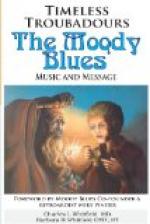The poetry which expresses such a state of mind is usually idealised and pictures the relationship rather as it might have been than as it was. The troubadour who knew his business would begin with praises of his beloved; she is physically and morally perfect, her beauty illuminates the night, her presence heals the sick, cheers the sad, makes the boor courteous and so forth. For her the singer’s love and devotion is infinite: separation from her would be worse than death; her death would leave the world cheerless, and to her he owes any thoughts of good or beauty that he may have. It is only because he loves her that he can sing. Hence he would rather suffer any pain or punishment at her hands than receive the highest favours from another. The effects of this love are obvious in his person. His voice quavers with supreme delight or [18] breaks in dark despair; he sighs and weeps and wakes at night to think of the one subject of contemplation. Waves of heat and cold pass over him, and even when he prays, her image is before his eyes. This passion has transformed his nature: he is a better and stronger man than ever before, ready to forgive his enemies and to undergo any physical privations; winter is to him as the cheerful spring, ice and snow as soft lawns and flowery meads. Yet, if unrequited, his passion may destroy him; he loses his self-control, does not hear when he is addressed, cannot eat or sleep, grows thin and feeble, and is sinking slowly to an early tomb. Even so, he does not regret his love, though it lead to suffering and death; his passion grows ever stronger, for it is ever supported by hope. But if his hopes are realised, he will owe everything to the gracious favour of his lady, for his own merits can avail nothing. Sometimes he is not prepared for such complete self-renunciation; he reproaches his lady for her coldness, complains that she has led him on by a show of kindness, has deceived him and will be the cause of his death; or his patience is at an end, he will live in spite of her and try his fortune elsewhere.[8]
Such, in very general terms, is the course that might be followed in developing a well-worn theme, on which many variations are possible. The [19] most common form of introduction is a reference to the spring or winter, and to the influence of the seasons upon the poet’s frame of mind or the desire of the lady or of his patron for a song. In song the poet seeks consolation for his miseries or hopes to increase the renown of his lady. As will be seen in the following chapter, manner was even more important than matter in troubadour lyrics, and commonplaces were revivified by intricate rime-schemes and stanza construction accompanied by new melodies. The conventional nature of the whole business may be partly attested by the fact that no undoubted instance of death or suicide for love has been handed down to us.




